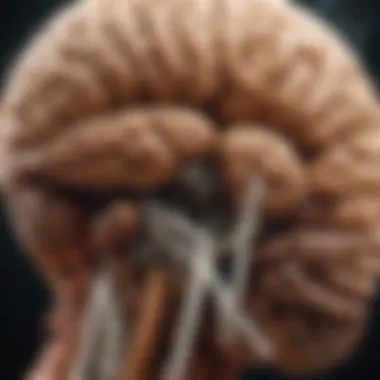The Impact of Smoking on Brain Function


Intro
Smoking is a pervasive habit that affects millions of individuals globally. Often associated with numerous physical health consequences, its impact on brain function is equally concerning. This article delves into the complex relationship between smoking and cognitive health, characterized by addiction, neurodegeneration, and cognitive impairment. We will examine how smoking alters brain biochemistry and functioning, drawing from current research to provide insight into potential recovery pathways following cessation.
Understanding the implications of smoking on brain function is crucial, not only for health professionals looking to guide patients but also for individuals seeking knowledge about their personal health choices.
Biochemical Mechanisms
The act of smoking introduces a plethora of chemicals into the body. Nicotine is the most notorious among these substances, acting swiftly on the brain's pleasure centers. When inhaled, nicotine reaches the brain within seconds. This rapid delivery contributes to its addictive properties. In biochemical terms, nicotine stimulates the release of neurotransmitters such as dopamine, which creates a sensation of pleasure.
However, this action triggers a cascade of changes within the brain, such as:
- Increased tolerance to nicotine, necessitating higher doses for the same effect.
- Potential alterations in receptor sites for neurotransmitters.
- Long-term changes in pathways that are crucial for learning and memory.
The impact of such changes can lead to both acute impacts on cognitive function and chronic issues, further complicating the smoker's brain health.
Cognitive Effects of Smoking
Cognition encompasses various mental processes, including attention, memory, and problem-solving. Research indicates that long-term smoking correlates with declines in cognitive performance. Smokers have been shown to exhibit deficits in:
- Attention span
- Memory recall
- Executive function, which governs reasoning and decision-making processes.
Such cognitive impairments are particularly concerning for older adults, where smoking is linked to an increased risk of developing neurodegenerative diseases, most notably Alzheimer’s disease.
Smoking is associated with a higher risk of cognitive decline and dementia in elderly populations.
Neurodegeneration
Chronic smoking is believed to contribute to neurodegeneration. This process involves the progressive loss of structure or function in neurons. Studies suggest that the toxins found in cigarette smoke may lead to inflammation and oxidative stress within the brain. Such states can exacerbate cellular damage and contribute to neurodegenerative diseases.
Upon cessation, some degree of recovery can occur. However, the extent largely depends on the duration and intensity of smoking habits. Key areas impacted include:
- Hippocampus, essential for memory formation
- Prefrontal cortex, associated with decision-making
The Recovery Pathway
Quitting smoking is crucial for transforming the trajectory of brain health. Evidence suggests that individuals who cease smoking can experience improvements in cognitive function over time. Factors that enhance recovery include:
- Engaging in regular physical activity
- Adopting a diet rich in antioxidants
- Managing stress through mindfulness practices
It is important to recognize that recovery may not happen uniformly and can vary individually.
Ending
The detrimental effects of smoking on brain function are substantial and complex. From cognitive impairments to neurodegeneration, smoking poses serious risks that affect individuals and society at large. Understanding these risks enables health professionals to better educate patients on the consequences of smoking and guide them towards healthier lifestyles. Engaging actively in recovery methods can lead to better outcomes, ultimately improving brain function after cessation.
For more information on the subject, consider visiting Wikipedia, Britannica, or exploring discussions on platforms like Reddit and Facebook.
Understanding the Basics of Smoking
Understanding the basics of smoking is pivotal in grasping its extensive effects on brain function. Not only does smoking have immediate impacts, but the long-term implications can shape cognitive health and overall well-being. This section lays the groundwork for comprehending how the act of smoking and the substances involved can alter brain function and contribute to numerous health issues.
What is Smoking?
Smoking refers to the act of inhaling and exhaling the smoke of burning tobacco. It often occurs through cigarettes, cigars, or pipes. The practice is prevalent across many cultures and has a long history. However, while some view it as a social activity, it is essential to recognize its addictive nature due to the nicotine present in tobacco. Understanding what smoking entails allows for a clearer examination of its myriad effects on mental and neurological health.
Chemical Composition of Cigarettes
Cigarettes contain a complex mixture of over 7,000 chemicals, many of which are harmful. When a cigarette is lit, the burning tobacco releases various toxic substances, including:
- Nicotine: The primary addictive component that impacts brain chemistry.
- Tar: A sticky substance that damages lung tissue and can settle in the brain.
- Carbon Monoxide: A colorless gas that reduces oxygen supply, affecting brain function.
- Formaldehyde and other carcinogens: These contribute to diseases and cognitive decline.
Understanding the chemical composition of cigarettes is crucial. Each of these substances can interact with the brain's neurochemical systems, potentially leading to significant health consequences.
Acute vs. Chronic Effects of Smoking


The effects of smoking can be classified into acute and chronic categories.
Acute effects occur shortly after smoking. These may include:
- Temporary relaxation or stimulation depending on the individual.
- Altered heart rate.
- Immediate cognitive changes, such as improved focus or alertness.
On the other hand, chronic effects develop over extended periods of smoking. These may encompass:
- Increased risk of neurodegenerative diseases.
- Long-term cognitive impairments.
- Persistent mood disorders, which can significantly affect mental health.
"The adverse brain effects caused by smoking accumulate, highlighting the need for immediate awareness and action from individuals and public health officials."
The distinction between acute and chronic effects stresses the importance of interventions and preventive strategies for reducing smoking-related harm.
Understanding these basics establishes the foundation for exploring deeper implications of smoking on brain health.
The Brain as a Target Organ
The role of the brain as a target organ in the context of smoking is both crucial and complex. When individuals use tobacco, the effects on brain function are multifaceted, influencing not only cognitive performance but also emotional health. Understanding how smoking impacts the brain can guide health professionals in creating effective intervention strategies.
One significant aspect to consider is the vulnerability of the brain to harmful substances found in cigarettes. The brain has a high metabolic rate and requires a continuous supply of oxygen and nutrients. Smoking compromises this supply due to the introduction of toxins, which can lead to impaired cognitive functions over time. The brain's ability to adapt to changes, known as neuroplasticity, is also affected, limiting its recovery potential after smoking cessation.
Smoking affects several key regions of the brain, each responsible for various cognitive and emotional functions. The implications suggest that targeted approaches in smoking cessation can enhance recovery in these areas, making it critical for professionals to understand this relationship.
Neuroanatomy: Key Brain Regions Affected
Research indicates that smoking has detrimental effects on multiple brain regions. Notable areas include:
- Prefrontal Cortex: This area is essential for decision-making, impulse control, and emotional regulation. Studies show that smokers may experience deficits in these functions, leading to increased risks of addiction and mood disorders.
- Hippocampus: Responsible for memory formation, the hippocampus is particularly vulnerable to the negative effects of smoking. Evidence suggests that chronic smokers may have reduced hippocampal volume, which correlates with difficulties in learning and memory.
- Amygdala: The amygdala plays a central role in emotional responses, including fear and pleasure. Smoking may dysregulate the processing of emotions, contributing to anxiety and stress-related disorders.
These regions collectively highlight the potential for significant long-term cognitive decline and emotional instability in smokers.
Neurotransmitter Systems and Smoking
Another layer of complexity involves the neurotransmitter systems that are influenced by smoking. Nicotine primarily affects neurotransmitters such as dopamine, serotonin, and norepinephrine. The impact of nicotine leads to:
- Dopamine Release: Nicotine stimulation of dopamine pathways activates the brain's reward system. This can enhance feelings of pleasure temporarily but leads to dependency over time.
- Alterations in Serotonin Levels: Smoking can disrupt serotonin levels, which play a critical role in regulating mood. This fluctuation may lead to increased risks of depression and anxiety disorders among smokers.
- Norepinephrine Activation: When norepinephrine signaling is affected, it can result in heightened stress responses and anxiety. Cumulative exposure to nicotine can impair this system, complicating stress management for individuals.
Understanding these neurotransmitter changes is essential for addressing the behavioral and psychological components of smoking addiction.
"The interplay between smoking and neurochemical systems in the brain underscores the challenges of overcoming nicotine dependence and the importance of tailored therapeutic approaches."
Awareness of how smoking impacts the brain enhances the development of comprehensive public health strategies. As professionals work in this realm, solidifying knowledge of these dynamics can improve the quality of care and recovery pathways for those affected by smoking.
Cognitive Decline and Smoking
Understanding the relationship between smoking and cognitive decline is essential for comprehending the broader impacts of tobacco use on brain health. Smoking is not just a habit; it affects the very foundation of cognitive functions such as memory, attention, and learning capabilities. Acknowledging the consequences gives health professionals and wellness coaches a framework for addressing smoking in their practice.
Impact on Memory and Learning
Research has shown that smoking significantly hinders memory formation and retrieval. Nicotine, although it initially enhances some cognitive tasks, leads to detrimental effects over time. Chronic exposure can cause alterations in hippocampal activity, where much of memory processing occurs.
Studies indicate that smokers may experience difficulties in recalling information. This is particularly evident in learning new material. The ability to encode and consolidate memories relies heavily on neural integrity, which smoking compromises. Thus, smokers may find themselves at a disadvantage in academic and professional settings, where effective memory is crucial.
Impaired Attention and Concentration
Another facet of cognitive decline in smokers is impaired attention and concentration. Regular tobacco use is linked to deficits in focus. Smokers often report challenges in maintaining prolonged attention on tasks, affecting productivity and quality of work. Attention is a fundamental aspect of cognitive performance, and its degradation can manifest itself in poor task execution.
Neuroscientific research indicates that nicotine alters the neurotransmitter systems related to attention, particularly acetylcholine pathways. This alteration can lead to distractibility and an overall decrease in cognitive efficiency. Consequently, individuals may turn to smoking for temporary relief, creating a cycle that deteriorates their focus further.
Long-Term Cognitive Consequences
The long-term cognitive consequences of smoking extend far beyond immediate memory and concentration challenges. Over years of smoking, cumulative damage to the brain can lead to neurodegenerative diseases. Conditions such as Alzheimer's disease have been associated with a history of smoking, where the risk escalates with increased exposure.
Moreover, smoking has been shown to hasten the cognitive decline associated with aging. Older adults who smoke are more likely to experience substantial declines in various cognitive domains compared to their non-smoking peers. Consequently, it becomes evident that the implications of smoking stretch into the lives and futures of individuals, emphasizing the pressing need for effective cessation programs.
In summary, smoking detrimentally impacts cognitive abilities, impairs memory, disrupts attention, and has severe long-term consequences that warrant thoughtful consideration and intervention. This knowledge can guide health professionals in addressing smoking as a significant factor in cognitive decline.


The Neurobiological Basis of Addiction
Understanding the neurobiological basis of addiction is crucial in examining how smoking affects brain function. Addiction is not merely a behavioral problem; it involves complex interactions between the brain's biochemical processes and environmental factors. Cigarettes contain nicotine, a potent stimulant that profoundly alters neural pathways. This alteration contributes to both the development of addiction and the challenges involved in cessation.
The implications of this topic resonate particularly among health professionals, wellness coaches, and others involved in rehabilitation efforts. Recognizing these underlying mechanisms aids in designing effective interventions to combat smoking addiction, enabling practitioners to approach addiction not just as a habit, but as a critical brain disease.
Dopamine and the Reward System
One of the primary ways nicotine affects the brain is through its interaction with the neurotransmitter dopamine. When a person smokes, nicotine enters the bloodstream and rapidly reaches the brain. Once there, it stimulates the release of dopamine within regions like the nucleus accumbens. This increase in dopamine produces feelings of pleasure and reinforcement, making the act of smoking rewarding.
The relationship between dopamine and smoking addiction can be summarized as follows:
- Reward Mechanism: The brain's reward system confirms the pleasurable experience, encouraging repeated behavior.
- Sensitization: Over time, the brain becomes desensitized due to prolonged nicotine exposure. More nicotine is needed to achieve the same pleasurable effect, leading to increased consumption.
- Withdrawal Effects: When a smoker tries to quit, the absence of nicotine results in reduced dopamine levels, leading to cravings and withdrawal symptoms.
This cycle of reward and withdrawal fuels the addiction, complicating smoking cessation efforts.
Psychological Dependency
Psychological dependency on smoking also plays a significant role in addiction. Unlike physical dependency, which involves withdrawal symptoms, psychological dependency relates to the emotional and mental aspects tied to smoking. Smokers often develop habits and routines that include smoking, which provide comfort or a sense of normalcy. It becomes part of their identity or lifestyle.
Several factors contribute to psychological dependency:
- Stress Management: Many individuals smoke to cope with daily stressors. The ritual of smoking can provide a temporary escape or relaxation.
- Social Influences: Peer pressure and social circles often affect smoking behaviors. Participating in group smoking can solidify the psychological aspect.
- Triggers: Smoker often have specific triggers that prompt them to smoke. This might include drinking coffee, after meals, or during breaks at work.
Combating psychological dependency requires comprehensive strategies, including therapy and support groups, to address the emotional aspects of smoking addiction.
"Understanding the neurobiological and psychological basis of addiction can inform public health strategies aimed at reducing smoking rates."
Smoking and Neurodegeneration
Smoking remains a significant public health concern, particularly due to its association with neurodegenerative diseases. This section explores how tobacco use contributes to cognitive decline and the onset of severe brain conditions. Understanding this relationship illuminates the urgent necessity for effective smoking cessation methods and greater public awareness around smoking’s neurological consequences.
Link to Alzheimer’s Disease
Research has established a correlation between smoking and the risk of developing Alzheimer’s disease. Smoking introduces numerous toxic compounds into the body, which may lead to inflammation and oxidative stress in brain cells. This cellular damage is believed to promote the accumulation of beta-amyloid plaques, a hallmark of Alzheimer’s. Studies have shown that smokers have a higher probability of experiencing cognitive impairment compared to non-smokers.
- Increased Inflammation: The inflammatory response triggered by smoking can contribute to neurodegenerative pathways.
- Cognitive Impairment: A decline in cognitive functions such as reasoning, memory, and the ability to learn is more pronounced in smokers.
- Vascular Health: Smoking adversely affects cardiovascular health, raising the risk for vascular dementia, which can co-occur with Alzheimer’s disease.
"The toxic elements in cigarettes are not just harmful to the lungs; they extend their reach to the brain, magnifying risks for diseases such as Alzheimer’s."
Smoking and Increased Stroke Risk
The relationship between smoking and stroke is well documented. Smokers face a significantly higher risk of both ischemic and hemorrhagic strokes. The physiological impacts of smoking, such as heightened blood pressure and thrombosis, compound this risk. In particular, strokes can lead to immediate and long-term cognitive deficits, thereby exacerbating the effects of neurodegeneration.
- Cerebral Blood Flow: Nicotine constricts blood vessels, limiting blood flow to the brain and increasing stroke probability.
- Coagulation Factors: Smoking negatively impacts blood coagulability, leading to a higher incidence of clot-related strokes.
- Recovery Challenges: Individuals who smoke may also face greater challenges in rehabilitation and recovery post-stroke, further hindering cognitive function.
Understanding these connections promotes informed health choices and emphasizes the importance of addressing smoking as a critical factor in neurodevelopmental health.
Emotional and Psychological Effects
The relationship between smoking and emotional health is complex and significant. Understanding the emotional and psychological effects of smoking is key to comprehending its broader impact on overall brain function. Tobacco use does not only affect physical health; it deeply influences mental well-being, presenting both immediate and long-lasting consequences. For health professionals and wellness practitioners, recognizing this interplay is vital in formulating effective strategies and interventions for cessation.
Smoking and Mood Disorders
Smoking has been linked to various mood disorders, including depression and anxiety. Research indicates that individuals who smoke are at a higher risk of developing these conditions compared to non-smokers. Nicotine, a primary component in cigarettes, can temporarily enhance mood but ultimately can exacerbate feelings of sadness and hopelessness. The initial relief smokers experience tends to be short-lived, leading to a cycle where users continuously seek relief without achieving lasting improvements. This creates a paradox; while individuals may smoke to alleviate stress, they can become more entrenched in their emotional struggles.
- Associations with Depression: Smokers often report elevated rates of depressive symptoms.
- Withdrawal Effects: Nicotine withdrawal can lead to irritability, restlessness, and signs of anxiety. This further complicates the mental health status of regular smokers.
There is a pressing need to understand that cessation can lead to improvements in mood for many. Studies show that quitting smoking can reduce symptoms of depression, highlighting the psychological benefits of stopping tobacco use.
Anxiety and Stress Management
Many individuals use smoking as a method of coping with anxiety and stress. The calming effect of nicotine can provide temporary relief, thus creating an illusion of stress management. However, relying on smoking for this purpose can lead to a more anxious state in the long run. The dependence on nicotine can increase the body's stress response, leading to heightened levels of anxiety when not smoking.
"While nicotine may provide a momentary reprieve from stress, the long-term consequences often include increased anxiety and dependence."
Managing anxiety without tobacco is foundational for mental health recovery:


- Alternative Coping Strategies: Exercise, mindfulness, and therapy can help individuals manage stress more effectively.
- Support Systems: Group therapy or support from wellness coaches can offer pathways toward healthier life choices.
In summary, the emotional and psychological effects of smoking present significant barriers to mental well-being. By addressing mood disorders and anxiety management, health professionals can assist clients in understanding the importance of cessation, leading to healthier outcomes for both mind and body.
Post-Cessation Brain Recovery
Neuroplasticity and Recovery Potential
Neuroplasticity is the brain's ability to reorganize itself by forming new neural connections. This capacity is crucial for recovery after cessation, as it allows the brain to adapt and potentially reverse some cognitive deficits associated with smoking. Research suggests that dopamine receptors, which are affected by tobacco use, can gradually return to normal levels post-cessation. This can lead to improvements in mood, memory, and overall cognitive function.
Studies indicate that within weeks after quitting, individuals experience enhanced cognitive skills, particularly in memory and processing speed. The brain's ability to rewire itself means that even long-time smokers can see improvements. Although the extent of recovery may vary from person to person, the neuroplastic potential offers a sense of hope for those who wish to reclaim their cognitive abilities.
Factors Influencing Recovery
Several factors influence the extent and speed of brain recovery after quitting smoking. These include:
- Duration and Intensity of Smoking: Prolonged and heavy smoking may result in more significant damage, leading to a longer recovery period.
- Age: Younger individuals may experience a more robust recovery due to the brain's greater resilience at a younger age.
- Physical Health: Overall health status, including diet and exercise, plays a critical role in cognitive recovery. Engaging in regular physical activity and consuming a balanced diet rich in antioxidants can support cognitive health post-cessation.
- Psychosocial Support: Having a strong support system can significantly impact the success of cessation and the recovery journey. Programs that provide counseling and support can enhance motivation and boost opportunities for recovery.
- Mental Health: Pre-existing mental health conditions can also affect recovery rates. Addressing these issues through therapy or medication may help improve recovery outcomes.
"Quitting smoking is not just about stopping cigarette use; it is about improving overall brain health and cognitive function for the future."
Understanding these factors can aid in developing tailored interventions that support individuals on their path to recovery. Knowledge about the brain's recovery mechanisms emphasizes the importance of cessation and its benefits for brain health, underlining the need for continued research in this area.
Implications for Public Health
The relevance of smoking on brain function extends well beyond individual health issues. It poses significant implications for public health, influencing not only personal well-being but also economic and social structures. As smoking remains a leading cause of preventable diseases, including various forms of neurodegeneration, addressing these implications is essential in shaping future health policies and initiatives.
Smoking Cessation Programs
Smoking cessation programs play a crucial role in mitigating the negative effects smoking has on the brain. These programs provide smokers with tools and support to quit, which can significantly improve cognitive health outcomes. Successful cessation can lead to a reduction in the risk of developing dementia and other cognitive impairments linked to smoking.
Benefits of Smoking Cessation Programs:
- Structured Support: Programs offer counseling and resources, guiding individuals through the quitting process.
- Access to Medications: These programs often provide information about nicotine replacement therapies such as patches and gums, which can ease withdrawal symptoms.
- Community and Social Support: Engaging with others in similar situations creates a sense of belonging and accountability, which helps in maintaining motivation to quit.
Research consistently shows that structured cessation programs result in higher quit rates. According to a study, the use of cessation programs leads to a 25% increase in successful quit attempts compared to unaided quitting.
Educational Campaigns on Brain Health
Educational campaigns focusing on brain health are critical in raising awareness about the connection between smoking and cognitive decline. These campaigns aim to promote understanding of how smoking can alter brain function and lead to irreversible damage over time.
Key elements of effective educational campaigns include:
- Awareness of Risks: Clearly communicating the cognitive risks associated with smoking helps individuals understand the stakes involved.
- Promoting Healthy Lifestyles: Integrating messages about overall brain health and lifestyle choices can help foster a holistic approach to well-being.
- Utilizing Multiple Platforms: Engaging audiences through social media, community workshops, and educational material can enhance reach and impact.
Public health campaigns that inform the populace about the dangers of smoking and promote healthy alternatives can play a significant part in reducing smoking rates. Collaborating with health professionals ensures that the information distributed is accurate and influential.
"Educating the public about the high costs of smoking—not just in financial terms but also in health—is a necessary step in fostering a well-informed community. Every individual informed has the potential to create change within their sphere of influence."
By fostering a culture of awareness and support through smoking cessation and educational efforts, the public health sector can make meaningful strides towards better brain health and overall well-being.
Future Directions in Research
Research about smoking-related impacts on brain function continues to evolve. Understanding the long-term effects of smoking is critical, as it informs public health initiatives and treatment options. Innovations can bridge gaps identified previously, focusing on prevention, recovery, and overall brain health. This section aims to highlight the ongoing exploration of treatment paradigms and uncover the hidden neural dynamics affected by smoking.
Innovative Treatments for Addiction
Effective management of smoking addiction remains a top priority. New treatments are emerging, focusing on both pharmacological and behavioral strategies.
- Pharmacological Innovations: Recent studies explore the efficacy of varenicline and bupropion, which assist in reducing cravings and withdrawal symptoms. Moreover, the development of vaccines against nicotine addiction presents a novel approach.
- Behavioral Interventions: Cognitive-behavioral therapy continues to offers personalized strategies focusing on trigger identification and coping mechanisms.
- Digital Applications: Mobile apps are growing popular; they provide tailored support to users, leveraging data to enhance cessation efforts based on individual patterns.
Emerging research also highlights the potential of neuromodulation techniques, such as transcranial magnetic stimulation, aimed at altering neural pathways associated with addiction. These insights hold promise for future smoking cessation programs.
Understanding Long-Term Effects on Brain Health
Investigating the long-term consequences of smoking on brain health is crucial. Studies aim to quantify how duration and frequency affect cognitive functions over time.
- Cognitive Decline: Longitudinal studies indicate that long-term smokers exhibit greater cognitive decline compared to non-smokers. The effects on executive functions and memory require further examination.
- Neurodegenerative Disorders: Research suggests a possible correlation between smoking and the onset of conditions such as Alzheimer’s disease and Parkinson’s disease. Understanding the mechanisms involved could lead to preventive strategies.
- Individual Variability: There is necessity to explore the biological variability among smokers, such as genetic differences that may affect how smoking impacts brain health.
In summary, future research harnesses a multifaceted approach to understand smoking’s repercussions on the brain. This includes innovative treatments and deeper insights into long-term effects.
"By investing in research, we can unlock new pathways that promote healthier lives and better brain function, ultimately mitigating the legacy of smoking."
The outcomes from these inquiries could potentially reshape smoking cessation strategies and brain health promotion on a global scale.















